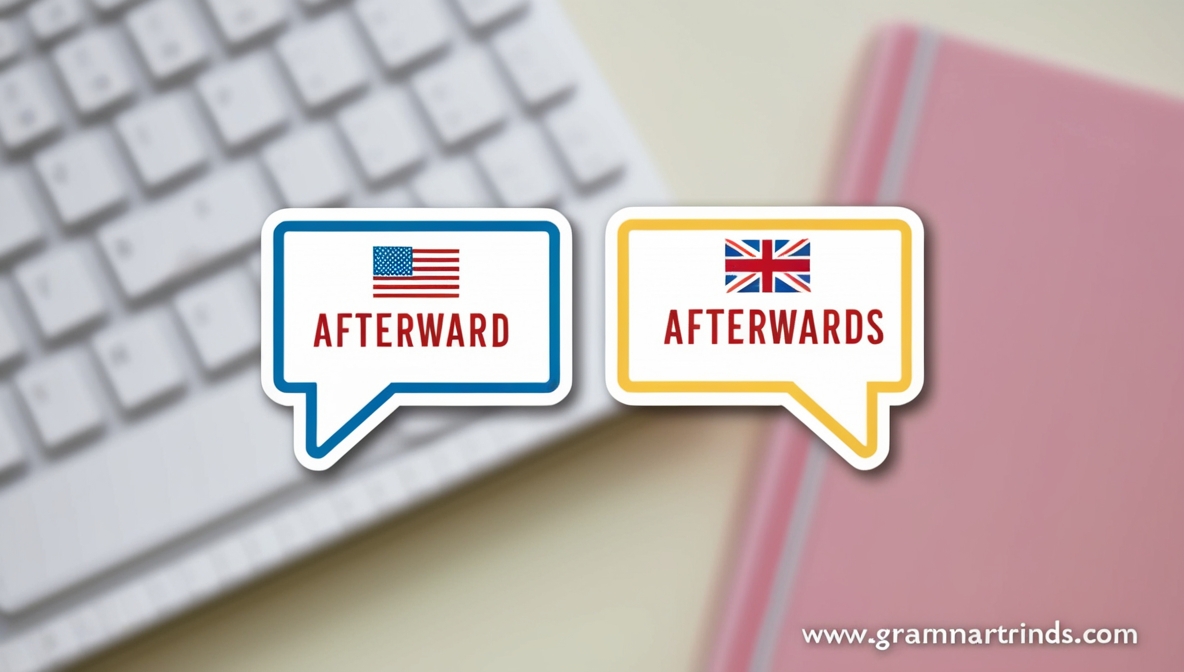When writing or speaking, the difference between afterward and afterwards often trips people up. Both words mean roughly the same thing, but their usage varies based on region, style, and context. Understanding the subtle distinctions between these two interchangeable words can boost your confidence in choosing the right form every time. This guide will clarify the usage of afterward and usage of afterwards with clear explanations, examples, and handy tips.
What Is Afterward
Afterward is a time-related adverb used to indicate something happening later or following an event. It is widely preferred in North American English, especially in the United States and Canada. This form ends with the suffix -ward, which often indicates direction or time in English.
Example: I went to the store and afterward, I met my friends for lunch.
In this sentence, afterward clearly points to the action that happened later. You’ll often find this version in American publications, where the -ward suffix is the norm for such adverbs.
What Is Afterwards
Afterwards performs the same function as afterward but includes the -wards suffix. This form enjoys more popularity in British English and other English-speaking regions outside North America. It carries the same meaning but often feels more natural in conversational or narrative contexts.
Example: She finished her homework and afterwards watched a movie.
The usage of afterwards aligns with typical British spelling conventions, reflecting broader English language variations between countries.
Key Differences Between Afterward and Afterwards
The main distinction lies in regional language preferences and stylistic choices. Americans tend to favor afterward, while the British often lean toward afterwards. Both are correct but keeping this difference in mind helps maintain a consistent tone.
| Feature | Afterward (American English) | Afterwards (British English) |
|---|---|---|
| Popularity | High in North America | Common outside North America |
| Suffix type | -ward | -wards |
| Formality | Slightly more formal | Conversational or narrative |
| Examples in writing | Academic, business, media | Literature, casual writing |
Use whichever fits your audience but avoid mixing the two in the same document to keep your writing clean and professional.
When to Use Afterward
You should use afterward when writing for an American audience or when following American English conventions. This word fits well in formal writing, business communication, and academic papers. It’s concise and direct, making it a favorite in publishing preferences within the U.S.
Example: The meeting ended, and afterward we reviewed the notes.
Tip: If you’re writing for a North American audience or submitting to U.S. publishers, stick to afterward for consistency.
When to Use Afterwards
Choose afterwards when your audience primarily uses British English or when writing in a more relaxed, conversational tone. It’s also common in storytelling, blogs, and informal communication within the UK and Commonwealth countries.
Example: He arrived late but afterwards joined us for dinner.
Tip: In British English settings, afterwards feels more natural and aligns with other word pairs like “forward/forwards” or “backward/backwards.”
Tips to Avoid Confusion
Mixing afterward and afterwards can feel jarring to readers. Here’s how to stay clear:
- Know your audience’s language conventions before writing.
- Pick one form and use it consistently throughout your text.
- Remember the suffix difference: -ward for North America, -wards for Britain.
- When in doubt, consult style guides like Chicago Manual of Style or Oxford English Dictionary.
Using these simple rules will help you avoid awkward shifts in tone and style.
Synonyms and Related Words
Both words mean “later” or “subsequently,” so you can use these synonyms when you want variety:
- Later
- Subsequently
- After that
- Thereafter
While these alternatives aren’t exact substitutes, they help diversify your vocabulary and avoid repetition.
Frequently Asked Questions
Is afterward more correct than afterwards?
No, both are correct; it depends on your audience’s regional preference.
Can I use afterward and afterwards interchangeably?
Yes, but avoid mixing them in the same text to maintain consistency.
Does it matter in formal writing?
Yes, formal writing usually follows regional norms, so pick the appropriate form for your audience.
Final Words
When it comes to afterward vs. afterwards, both words mean the same thing. The main difference is where you are. In American English, people usually say afterward. In British English, afterwards is more common. Either word works, but stick to one to keep your writing clear. If you’re unsure, think about your audience and the style you want. Now you know when to use each one, your writing will sound natural and polished. Keep this simple rule in mind next time you write!
